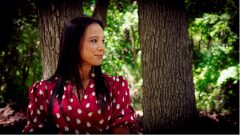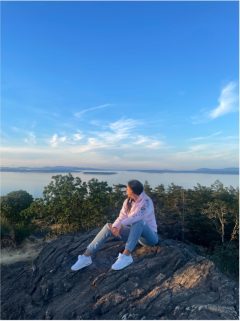The Pathfinders Series Feature: Amsey Maracle
THE PATHFINDERS: RFNG’s Amsey Maracle on youth leadership and why First Nations self-governance matters
| The Rebuilding First Nations Governance Project is chatting with movers and shakers advancing First Nations’ inherent right to self-government in Canada. Part Q&A and part F.A.Q., The Pathfinders features members of our project and others talking about why self-government matters to them and why it should matter to you. |

Amsey Maracle (pictured) wants young First Nations people to know they represent the future of their communities’ self-governance. She’s happy to be helping them along the way.
Amsey is Mohawk and Plains Cree from Tyendinaga Mohawk Territory in Ontario and Muskeg Lake Cree Nation in Treaty 6, Saskatchewan. She’s a research assistant at the Rebuilding First Nations Governance Project (RFNG) where she helps carry out the project’s mission to support First Nations communities transitioning out of Indian Act administration to self-government under their own inherent right. Amsey currently spearheads the project’s youth leadership initiative and works closely with First Nations in Canada alongside the RFNG’s partner organization, the Centre for First Nations Governance.
In this edition of The Pathfinders: What motivates Amsey to fight for First Nations self-governance, what inherent rights governance means for First Nations communities, why youth leadership matters, and how youth can get involved.
Content Warning: mention of residential schools, intergenerational trauma
What do you do at the RFNG?
I’m working closely with the project management team and our partner, the Centre for First Nations Governance, as a research assistant with the Rebuilding First Nations Governance Project. I’m also heading up youth leadership. Last year we had our first Inherent Rights Youth Initiative (IRYI) gathering that brought together youth from across Canada. We worked with them throughout the summer months into the fall, providing guidance alongside Elders and Medicine People to help them become inherent rights leaders and giving them the tools they need to succeed and drive change in their Nations.
One of our youth who took part in the initiative with us from Lil’wat said it would be really great to have a storytelling initiative this year. So that’s what we’re planning now. That’s going to be starting up in September, and it’ll be wrapping up with a gathering in December.
When we say “inherent rights governance,” what do we mean?
Oh man, this is such a packed question. I mean, when I think about the inherent right to self-governance, I think about returning to or building upon the way we used to govern our people pre-contact. We have the right to govern ourselves because we have been here and have governed ourselves long before Europeans arrived. Colonization may have threatened that right, but we still have it. It’s recognised through section 35 of the Canadian constitution, and there are a growing number of court decisions that reaffirm it and speak to its importance in reconciling the impacts we see today as a result of colonization.
We have governing systems that still exist. We know them. We’re still teaching them to our people, but we’re stuck under the Indian Act and colonization. We haven’t been using the sophisticated systems we have to govern our people and provide essential services to our people in a way that truly reflects inherent rights governance. We’re stuck under a system that isn’t ours. It isn’t inherent to us, and it shows in every area of governance and public administration we see in our communities. And that’s a real problem.
Inherent rights governance is about rebuilding our governing systems so that we’re managing ourselves. We had these systems in place long before European contact. We have the capability, we have the capacity and we have the knowledge to be able to govern ourselves. And we need to get back to that because living under a system that was designed to destroy us will never get us through the problems we face today.
Why should young First Nations people care about First Nations’ right to govern themselves?
Oh, that’s so important. You know, it really is the youth that are going to lead the way. And I think a lot of the youth today are waking up to the history of colonization, and they’re not accepting of it. They know what they’ve been robbed of, and they’re not wanting to live under the Indian Act for another generation. It’s so important for youth to be involved in inherent rights governance because it really is the young people who will govern our people and who will manage our affairs in the coming years. It’s important that our leaders today are working with our youth and creating those opportunities for youth to be able to learn what inherent rights governance is and know what it means.
What excites you about youth leadership?
You know, coming out of the IRYI gathering last year, it was phenomenal to see the change in the youth as we were going along. At the end of the gathering, we were hearing from youth that they felt so much more confident in their knowledge about inherent rights governance and that some were running for youth leadership positions in their communities. Others were having conversations with other youth and community members, spreading the word about the importance of our inherent rights, what it means for us and what we should be doing with it.
That was so exciting to see. These teachings we’re providing to the youth are sparking an interest in them to want to be involved on a political level and want to make the changes that they’re not seeing in their communities.
What moments in your life inspired you to do the work that you do?

I always knew that the Indian Act was bad. Growing up, there was always this question of why do we have the Indian Act? Why aren’t we doing anything to get rid of it? Why aren’t we doing anything to solve the problems? It wasn’t until I started to ask those questions and really start to figure out how I could find the answers to those questions that I started to learn about colonization, about governance, about the impact the Indian Act has had on our communities and our people. And the fact that it was willfully done to our people and intentionally done to our people really struck a chord with me. We can’t stay under a system that was designed specifically for those reasons, and we don’t have to. So let’s put in the work that is needed to get out from under it.
I do this work for my grandparents: the residential school survivors in my family, so that my son and First Nations children never have to experience what my grandparents went through in school again. It still really gets to me when I think about how my grandparents must have felt in residential school. It breaks my heart honestly. When I think about the idea of my son being forced to attend a school like that simply because he’s an Indian, I can’t imagine how our great grandparents must have felt, how our grandparents felt, how our parents felt growing up with parents who didn’t know how to show love. It’s impacted all of us. Five generations in my own life and probably more. It’s all about breaking the cycles for me so that my son and other First Nations children have different stories to tell.
It wasn’t until 2015 that I really learned about residential schools, listened to my grandparents’ stories at the Truth and Reconciliation Commission closing events in Ottawa and participated in it with them that I started to realize the impact residential school has had on my own life—the intergenerational trauma I’ve been struggling with and carrying my whole life. I do the work that I do so that our children have different experiences than those of my grandparents, my parents and me. I do this work so that my grandparents know their grandchildren and great grandchildren will have different experiences and stories from their childhood, especially in places as fundamental as the education system that will help shape their futures in a positive way.
What impact do you hope your work has on Canada and First Nations peoples?
I really hope to see more communities transitioning out of the Indian Act and rebuilding their own inherent governance. And I really hope to see Canadians finding ways to be allies and ways to reconcile within themselves and the systems they’ve created. I think one of the things that has really blown me away throughout this whole experience with the Rebuilding First Nations Governance Project is seeing communities and the people in communities having the conversations that are needed to change the system they’re under. I’m working really closely with Upper Nicola First Nation right now, and they’re just a phenomenal community that’s so proactive and so ready for this work. You know, they’re doing it. It’s been amazing being a small part of that journey, and I’m so grateful for the opportunity to follow along with them.
How do you recommend young First Nations folks get involved with inherent rights governance?
Young First Nations can get involved with inherent rights governance by reaching out to us! Tell us you’re interested in learning more and being the change your community needs. Join our initiative and become an inherent rights leader with us!
First Nations youth should be asking the leadership in their community the questions they want answered. Why are we still under the Indian Act? What are we doing to transition to self-governance? What can I do to help our community get out from under the Indian Act?
First Nations youth can also get involved in inherent rights governance by learning about themselves: who they are, who they belong to, where they come from, their stories, their histories and everything that shapes their identity. First Nations youth can get involved by learning their language, by talking about inherent rights with others, by going to school and influencing the systems, and by learning from Elders and gaining the resources that are needed to work towards rebuilding our own governance systems.
Interviews for The Pathfinders have been edited for length and clarity. Written by Ben Sylvestre with editorial oversight from Amsey Maracle. The Rebuilding First Nations Governance Project is supported in part by funding from the Social Sciences and Humanities Research Council.
| More Questions? Send us an email! |